DotNetCore 3.0 助力 WPF本地化
Posted luquanmingren
tags:
篇首语:本文由小常识网(cha138.com)小编为大家整理,主要介绍了DotNetCore 3.0 助力 WPF本地化相关的知识,希望对你有一定的参考价值。
概览
随着我们的应用程序越来越受欢迎,我们的下一步将要开发多语言功能。方便越来越多的国家使用我们中国的应用程序,
基于 WPF 本地化,我们很多时候使用的是系统资源文件,可是动态切换本地化,就比较麻烦了。
有没有一种方法既可以适用系统的资源文件,又能方便快捷的切换本地化呢?
实现思路
现在我们将要实现的是基于 DotNetCore 3.0 以上版本 and WPF 桌面应用程序模块化的多语言功能。
动态切换多语言思路:
- 把所有模块的资源文件添加到字典集合。
- 将资源文件里的key,绑定到前台。
- 通过通知更改
CurrentCulture多语言来使用改变的语言文件里的key。 - 通过绑定
Binding拼接Path 在输出。
搭建模拟业务项目
创建一个WPF App(.NET Core)应用程序
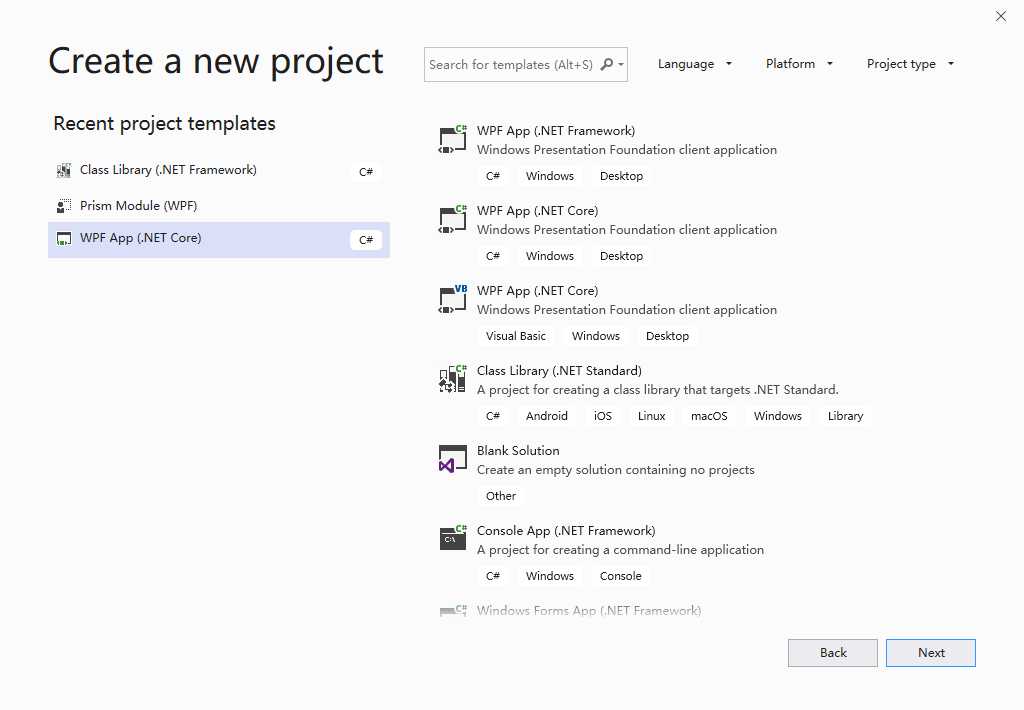
创建完成后,我们需要引入业务A模块及业务B模块和业务帮助模块
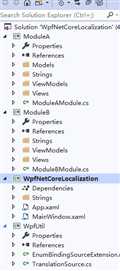
PS:根据自己的业务需要来完成项目的搭建。本教程完全适配多语言功能。
使用.resx资源文件
在各个模块里添加Strings 文件夹用来包含 各个国家和地区的语言文件。

多语言可以参考:https://github.com/UnRunDeaD/WPF---Localization/blob/master/ComboListLanguages.txt
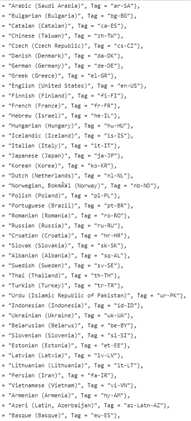
资源文件可以放在任意模块内,比如业务模块A ,主程序,底层业务,控件工具集等
创建各个业务模块资源文件
Strings文件夹可以任意命名
SR资源文件可以任意命名

帮助类
封装到底层供各个模块调用
public class TranslationSource : INotifyPropertyChanged
public static TranslationSource Instance get; = new TranslationSource();
private readonly Dictionary<string, ResourceManager> resourceManagerDictionary = new Dictionary<string, ResourceManager>();
public string this[string key]
get
Tuple<string, string> tuple = SplitName(key);
string translation = null;
if (resourceManagerDictionary.ContainsKey(tuple.Item1))
translation = resourceManagerDictionary[tuple.Item1].GetString(tuple.Item2, currentCulture);
return translation ?? key;
private CultureInfo currentCulture = CultureInfo.InstalledUICulture;
public CultureInfo CurrentCulture
get return currentCulture;
set
if (currentCulture != value)
currentCulture = value;
// string.Empty/null indicates that all properties have changed
PropertyChanged?.Invoke(this, new PropertyChangedEventArgs(string.Empty));
// WPF bindings register PropertyChanged event if the object supports it and update themselves when it is raised
public event PropertyChangedEventHandler PropertyChanged;
public void AddResourceManager(ResourceManager resourceManager)
if (!resourceManagerDictionary.ContainsKey(resourceManager.BaseName))
resourceManagerDictionary.Add(resourceManager.BaseName, resourceManager);
public static Tuple<string, string> SplitName(string local)
int idx = local.ToString().LastIndexOf(".");
var tuple = new Tuple<string, string>(local.Substring(0, idx), local.Substring(idx + 1));
return tuple;
public class Translation : DependencyObject
public static readonly DependencyProperty ResourceManagerProperty =
DependencyProperty.RegisterAttached("ResourceManager", typeof(ResourceManager), typeof(Translation));
public static ResourceManager GetResourceManager(DependencyObject dependencyObject)
return (ResourceManager)dependencyObject.GetValue(ResourceManagerProperty);
public static void SetResourceManager(DependencyObject dependencyObject, ResourceManager value)
dependencyObject.SetValue(ResourceManagerProperty, value);
public class LocExtension : MarkupExtension
public string StringName get;
public LocExtension(string stringName)
StringName = stringName;
private ResourceManager GetResourceManager(object control)
if (control is DependencyObject dependencyObject)
object localValue = dependencyObject.ReadLocalValue(Translation.ResourceManagerProperty);
// does this control have a "Translation.ResourceManager" attached property with a set value?
if (localValue != DependencyProperty.UnsetValue)
if (localValue is ResourceManager resourceManager)
TranslationSource.Instance.AddResourceManager(resourceManager);
return resourceManager;
return null;
public override object ProvideValue(IServiceProvider serviceProvider)
// targetObject is the control that is using the LocExtension
object targetObject = (serviceProvider as IProvideValueTarget)?.TargetObject;
if (targetObject?.GetType().Name == "SharedDp") // is extension used in a control template?
return targetObject; // required for template re-binding
string baseName = GetResourceManager(targetObject)?.BaseName ?? string.Empty;
if (string.IsNullOrEmpty(baseName))
// rootObject is the root control of the visual tree (the top parent of targetObject)
object rootObject = (serviceProvider as IRootObjectProvider)?.RootObject;
baseName = GetResourceManager(rootObject)?.BaseName ?? string.Empty;
if (string.IsNullOrEmpty(baseName)) // template re-binding
if (targetObject is FrameworkElement frameworkElement)
baseName = GetResourceManager(frameworkElement.TemplatedParent)?.BaseName ?? string.Empty;
Binding binding = new Binding
Mode = BindingMode.OneWay,
Path = new PropertyPath($"[baseName.StringName]"),
Source = TranslationSource.Instance,
FallbackValue = StringName
;
return binding.ProvideValue(serviceProvider);
前台绑定
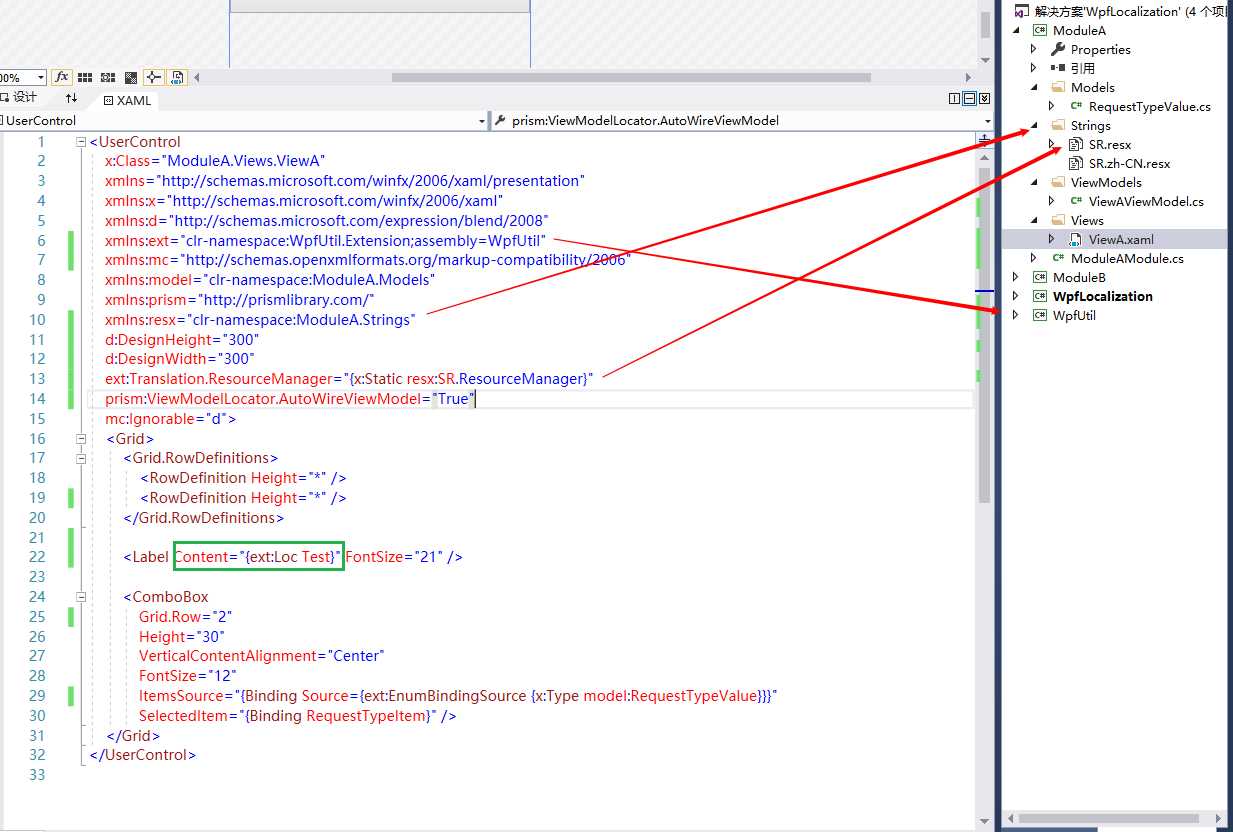
//引用业务模块
xmlns:ext="clr-namespace:WpfUtil.Extension;assembly=WpfUtil"
// 引用刚才你命名的文件夹名字
xmlns:resx="clr-namespace:ModuleA.Strings"
// 每个模块通过帮助类,将当前模块的资源类,
// 加载到资源管理集合里面用于分配每个键值
// 引用刚才你命名的资源文件名字 -> SR
ext:Translation.ResourceManager="x:Static resx:SR.ResourceManager"显示文字
//读取资源文件里的键值
<Label Content="ext:Loc Test" FontSize="21" />后台实现
根据业务的需要,我们在界面上无法适用静态文字显示的,一般通过后台代码来完成,对于 code-behind 的变量使用,同样可以应用于资源字典。
比如在业余模块代码段里的模拟实现
// SR 是当前业务模块的资源文件类,管理当前模块的资源字符串。
// 根据不同的 `CurrentCulture` 选择相对应的本地化
Message = string.Format(SR.ResourceManager.GetString("Message",TranslationSource.Instance.CurrentCulture),System.DateTime.Now);动态切换
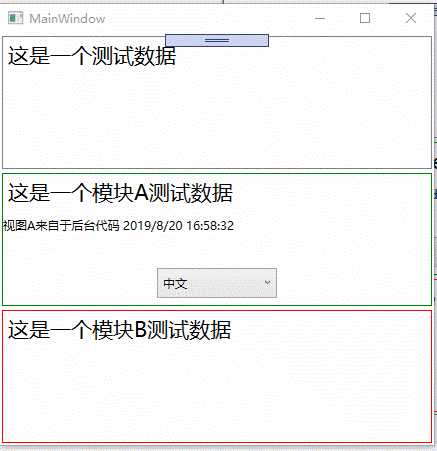
PS: 欢迎各位大佬慷慨指点,有不足之处,请指出!有疑问,请指出,喜欢它,请支持!
下载地址
https://github.com/androllen/WpfNetCoreLocalization
相关链接
https://github.com/Jinjinov/wpf-localization-multiple-resource-resx-one-language/blob/master/README.md
https://codinginfinity.me/post/2015-05-10/localization_of_a_wpf_app_the_simple_approach
以上是关于DotNetCore 3.0 助力 WPF本地化的主要内容,如果未能解决你的问题,请参考以下文章